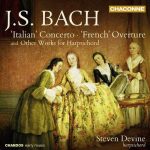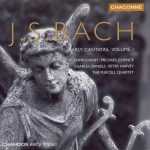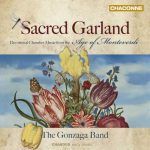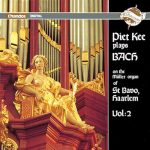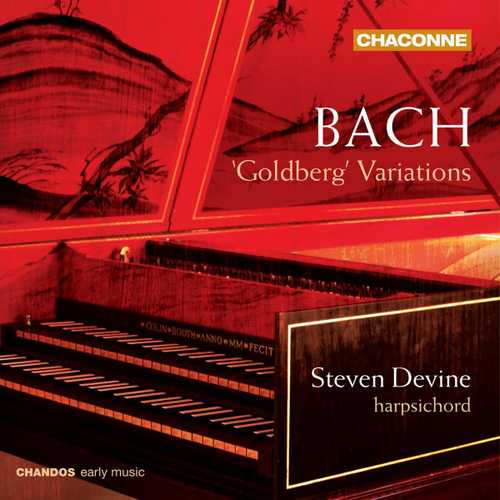
Composer: Johann Sebastian Bach
Performer: Steven Devine
Format: FLAC (tracks)
Label: Chandos
Catalogue: CHAN0780
Release: 2011
Size: 545 MB
Recovery: +3%
Scan: yes
Goldberg Variations, BWV988
01. Aria
02. Variatio 1. a 1 Clav.
03. Variatio 2. a 1 Clav.
04. Variatio 3. Canone all’Unisuono a 1 Clav.
05. Variatio 4. a 1 Clav.
06. Variatio 5. a 1 o vero 2 Clav.
07. Variatio 6. Canone alla Seconda. a 1 Clav.
08. Variatio 7. a 1 o vero 2 Clav.
09. Variatio 8. a 2 Clav.
10. Variatio 9. Canzone alla Terza. a 1 Clav.
11. Variatio 10. Fughetta. a 1 Clav.
12. Variatio 11. a Clav.
13. Variatio 12. Canone alla Quarta. a 1 Clav.
14. Variatio 13. a 2 Clav.
15. Variatio 14. a 2 Clav.
16. Variatio 15. Canone alla Quinta. a 1 Clav.
17. Variatio 16. Ouverture. a 1 Clav.
18. Variatio 17. a 2 Clav.
19. Variatio 18. Canone alla Sexta. a 1 Clav.
20. Variatio 19. a 1 Clav.
21. Variatio 20. a 2 Clav.
22. Variatio 21. Canone alla Settima. a 1 Clav.
23. Variatio 22. a 1 Clav.
24. Variatio 23. a 2 Clav.
25. Variatio 24. Canone all´ Ottava. a 1 Clav.
26. Variatio 25. a 2 Clav.
27. Variatio 26. a 2 Clav.
28. Variatio 27. Canone alla Nona. a 2 Clav.
29. Variatio 28. a 2 Clav.
30. Variatio 29. a 1 o vero 2 Clav.
31. Variatio 30. Quodlibet. a 1 Clav.
32. Aria da capo
The ‘Goldberg’ Variations by Bach are considered among the most commanding and inspired sets of variations of any period, and one of the most ambitious compositions ever written for harpsichord.
They are performed here by Steven Devine on a double-manual harpsichord by Colin Booth (2000) after Fleischer (1710). The co-director of the Orchestra of the Age of Enlightenment, Devine also plays the harpsichord with The Gonzaga Band and London Baroque, and has been performing Bach’s Variations extensively in the UK.
The ‘Goldberg’ Variations begin with a highly embellished but unpretentious Aria, around which Bach builds a series of thirty variations that range from the high-spirited to the introspective. The epic scope of this work is not only a consequence of its length, but also of the enormous variety that is presented here – in terms of both style and mood – and of the way the whole piece is held together by the constant underlying theme of the opening Aria. The variations were very advanced for their time, looking forward to the much later ‘Diabelli’ Variations by Beethoven as well as the ‘Corelli’ Variations by Rachmaninoff.
The set of thirty variations was supposedly commissioned by Baron von Keiserling, the Russian ambassador to the Dresden court, to help him get through his many nights of insomnia, and named after the baron’s harpsichordist, who played them. However, as the set was published in 1741, and Goldberg was born in 1727, unless he was an exceptionally talented harpsichordist, the more likely explanation was that Bach wrote them for his son Wilhelm Friedemann to play, and perhaps donated a few to the young Goldberg.
Whatever the truth of its origins, there is no denying the exceptional excellence of the work. In the words of Steven Devine: ‘This is a wonderful collection of dance movements, interspersed with passionate cannons and virtuosic hand-crossings, all framed by a simple unpretentious Aria.’
